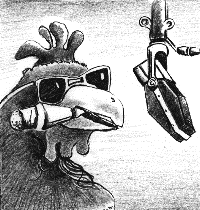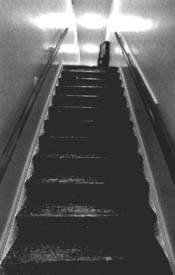
Back Door BluesSometimes controversy just slips in the back door when you’re not expecting it. Such was the case with last issue’s article "Strange Voodoo: Inside the Vaults of Chess Studios" by D. Thomas Moon. What we thought we’d published was a pleasant and engaging little tour of the former studios of Chicago’s pre-eminent blues label of the ’50s and ’60s and an update on the foundation that has restored the building. So we weren’t quite prepared for the amount of heat it generated. The first inkling that all was not as it appeared to be came in a phone call from Nadine Cohodas (see "Letters,") contesting statements in the article concerning the use of the back staircase and Leonard Chess’ ownership of a nightclub at 708 E. 47th St. Having worked with Cohodas in the past, we knew her to be a thorough and dogged reporter, so our antennae automatically went up. Our next call came from Dick LaPalm, for many years the head of public relations for Chess Records. LaPalm was quite upset and claimed that there were numerous inaccuracies in the article, including assertions by Blues Heaven Foundation director Shirli Dixon-Nelson that there was a shipping and packaging area on site, that Chuck Berry lived in the basement at 2120 S. Michigan Ave. and the question of ownership of the 708 Club. (Although Moon notes that Willie Dixon and Don Snowden’s mention of such ownership went uncontested when it appeared in Dixon’s 1989 autobiography, I Am the Blues.) But what concerned him more were statements by Dixon-Nelson that "most Chess artists were directed to use these back stairs to get up to the studio and rehearsal rooms" and that "whether you were Muddy Waters or Chuck Berry or Bo Diddley or Willie Dixon, it didn’t matter. You were to use these back stairs to access the building — you weren’t allowed access to the first floor." She further went on to say that black artists "came into a facility where they were directed to use the back stairs, where they were not allowed in certain areas, where they were an MF this or an MF that or an SOB this or an SOB that." LaPalm flatly denied the implied charge of racism. Shirli Dixon-Nelson is the daughter of the late Willie Dixon, and she has undertaken the unpaid position of executive director of Blues Heaven to fulfill her father’s dream of an organization that would help blues musicians in need and encourage the public to learn more about the blues. The elder Dixon, in addition to his obvious huge talents as a songwriter and musician, was the man who — as producer, arranger and point person for artists and repertoire — made most of those Chess recording sessions come alive. The core of his career is intertwined with the Chess studios, and there simply couldn’t be a more fitting location for his legacy. The building at 2120 S. Michigan was designed by architect Horatio Wilson and constructed in 1911. It was remodeled for Chess in 1956–’57 by John S. Townsend Jr. and Jack Wiener. (According to Tim Samuelson of the city’s Landmark Commission, it was Wiener who designed and engineered the actual recording studio.) The back staircase was part of the original building; the front stairs were added during the ’50s remodeling.
Tom Moon points out that "there is no questioning the fact that many African-American musicians from the Chess stable remain embittered by the way they perceive that their affairs were handled during racially turbulent times." But the back door? Several Chess artists that Moon spoke with remembered using the door to get their equipment into the studio. However, he notes, "No mention was made of race matters, but, based upon those statements and other sentiments they expressed, I did not question this as a possibility at the time." Max Cooperstein worked in sales and promotion for Chess from 1958 to 1967, as well as doing some recording and production. <WHEN I ASKED HIM> he barely remembered the back staircase at all but pointed out that there were always lots of people, black and white, hanging out in the front lobby: artists, disc jockeys, aspiring musicians. Esmond Edwards was A&R director for Chess’ jazz recordings from 1962 to 1967. He recalls the Chess brothers as being very "chummy" with the musicians. As far as using profanity with the artists, "they got as good as they gave," particularly when dealing with rough and tumble characters like Sonny Boy Williamson and Howlin’ Wolf. Were the artists exploited? "Fiscally exploited, yes, but not racially." Tim Samuelson, who spearheaded the drive to get Chicago Landmark status for 2120, described his perception of the relationship between the Polish immigrant Chesses and their ghetto-dwelling musicians as "an alchemy of underdogs. If they were exploiters, they were equal-opportunity exploiters." An incredulous Billy Davis, for many years the overall A&R man for Chess, told Cohodas that when Willie, Muddy, Wolf or Little Walter came to 2120, "the doors flew open for them." Though they represent a mix of black and white, LaPalm, Cooperstein, Edwards and Davis all held upper-level positions at Chess. What did the musicians have to say? Little Milton, whose first hit, "Blind Man," was recorded at 2120: "That’s ridiculous. Believe me, that’s bullshit. You get a lot of ignorant nonsense people that don’t know what they’re talking about… You shouldn’t take what they say to start anything racial." As for the Chess brothers’ reputed penurious ways: "Everybody is in business to try and make money and protect themselves. They’re not going to open up their bank account; they’d go out of business. If you demanded respect they would give it to you. If you acted like a fool you got treated casually. No racial slurs were used with me or around me." Dixon-Nelson has been recording oral histories to preserve the words of those who were around at the time, and it is from these accounts that she based her remarks. Because she feels uncomfortable sharing these stories that were given to her "like family," we were only able to see a few very brief excerpts with no way of knowing the context of the remarks. But one musician who did agree to let her show us a transcript of his comments about the back stairs was guitarist Jimmie Lee Robinson, who recorded with Little Walter in the late ’50s. In his statement he says, "We were exploited." He later adds, "I don’t think it’s racism. I know it’s racism." In a recent phone conversation, however, Robinson hedged that strong claim. "It wasn’t that it was an issue that we had to go up the back stairs," he told me. "You’ve got an office in front and you don’t want a whole lot of traffic, dragging equipment and stuff, just like [you wouldn’t] in your own house. "It wasn’t a thing of black-white prejudice," he explained, but more to do with class distinction and the social order. As he told Dixon-Nelson, "Some people were not part of the clan like their secretary, A&R men or producers, etc. [were], and were kept in their place." Judging from these accounts (and Koko Taylor’s statement that she "never used the back door, but was escorted around" by Willie Dixon), the likeliest scenario is that backing musicians often used — and were possibly asked to use — the back door to load in equipment. It’s analogous to a club where the "grunt" musicians use the backstage door while the star performer is shown the red carpet. Hardly grounds for a claim of racism. According to Dixon-Nelson, comments like the ones she made to Moon have been removed from the Blues Heaven tour. It’s comfortable to say that the treatment black artists received at the hands of record companies in the ’50s was "a product of the times," i.e., institutionalized racism, as though such a thing doesn’t exist in today’s society. We applaud Blues Heaven’s efforts to give a broad picture of the circumstances at the premiere independent blues label of the era. But to look at Chess — a company that hired blacks in management positions and did indeed further the careers of so many blues artists — through our present-day filters and tar it with the brush of racism seems patently arbitrary. Until there is some solid evidence to support such a claim, BLUES ACCESS regrets any part it may have had in doing so.
Blues from the Red Rooster Lounge originates on Boulder's KBCO 97.3 FM (where it can be heard Sundays at 9 p.m.) and airs weekly on 15 radio stations around the U.S.. Check with your local station for availability. (Station program directors can receive a sample copy of the program by calling the Longhorn Radio Network at 1-800-457-6576.) The Rooster also consults for the MusicChoice digital cable radio service, a 24-hour commercial-free, all-blues channel available from hundreds of cable providers nationwide.
|



 LaPalm
remembers the rear stairs as a way that he, Leonard or Phil Chess could
slip out when artists (usually demanding money) or anyone else they
didn’t want to see was out front. But Shirli Dixon-Nelson has statements
from several black musicians that they were made to use the back door,
with the very strong implication that this was a racially motivated
request.
LaPalm
remembers the rear stairs as a way that he, Leonard or Phil Chess could
slip out when artists (usually demanding money) or anyone else they
didn’t want to see was out front. But Shirli Dixon-Nelson has statements
from several black musicians that they were made to use the back door,
with the very strong implication that this was a racially motivated
request.
